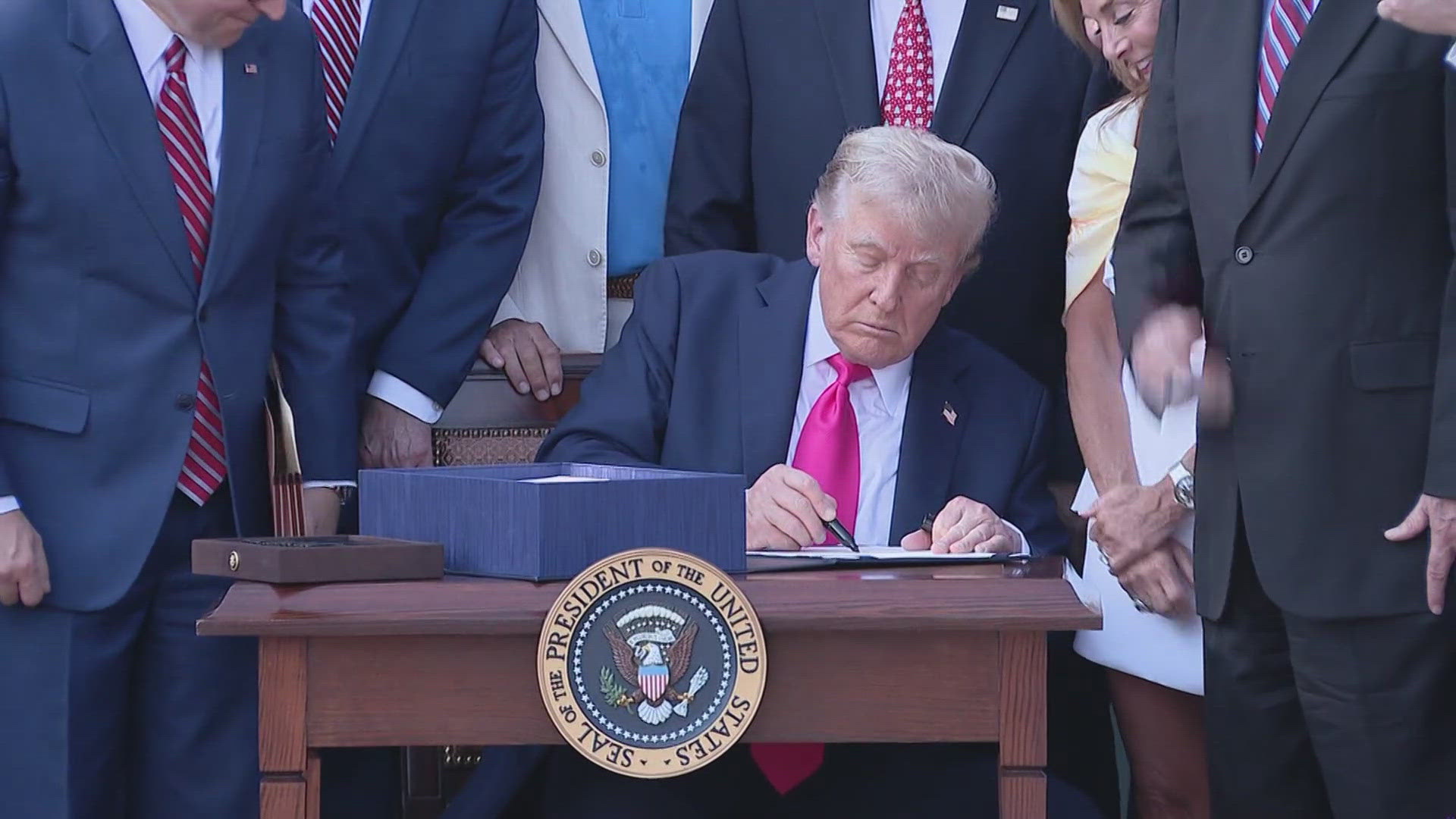SEATTLE — President Donald Trump signed his package of tax breaks and spending cuts into law Friday, overcoming internal setbacks to approve the cornerstone of his second-term agenda just ahead of the Fourth of July holiday.
A major feature of the legislation is the extension of the 2017 tax cuts, which had been set to expire in 2025. The bill maintains lower tax rates across the board and nearly doubles the standard deduction. It also extends the expanded child tax credit.
Several new deductions are included: tipped wages up to $25,000, overtime pay up to $12,500, auto loan interest, and Social Security income — the latter exempting about 90% of recipients from federal taxes.
The bill also lifts the alternative minimum tax requirement for high earners making over $500,000 annually and maintains a reduced corporate tax rate. According to a Yale research center, the bottom fifth of earners would see their annual after-tax incomes fall by 2.3% over the next decade, while top earners would see an equivalent gain.
The Congressional Budget Office estimates the bill will add $3.3 trillion to the national debt over the next 10 years.
“This is by no means a perfect bill, but it delivers on our commitment while benefiting farmers, families and small business owners across central Washington,” said Rep. Dan Newhouse, R-Wash., in a statement.
Health care cuts loom for Apple Health
One of the bill’s largest impacts on Washington involves Medicaid — known locally as Apple Health — which covers about 2 million residents, or one in five people in the state.
The legislation cuts $1 trillion in Medicaid funding nationwide over 10 years. In Washington, federal contributions would shrink by 19%, according to the Associated Press. KFF projects the state will lose between $31 billion and $51 billion in federal Medicaid funding during the same period — or at least $3 billion per year.
“It is impossible to overstate just how devastating this legislation will be for Washingtonians,” Gov. Bob Ferguson said in a statement. “This morally bankrupt decision will cause our most vulnerable residents to lose their health care coverage and likely force hospital closures across the state, all to pay for tax breaks for the richest Americans.”
RELATED: Emergency doctors sound alarm over Medicaid threats as Trump's sweeping policy bill nears House vote
Stricter eligibility rules — including new work requirements and more frequent income checks — are expected to push about 250,000 Washingtonians off Medicaid rolls. Another 150,000 could lose access to subsidized health plans on the state’s health insurance exchange.
Sen. Patty Murray, D-Wash., warned that 14 rural hospitals across the state are now at risk of closure. The bill does include $50 billion over five years to support rural hospitals nationwide.
It also bars federal funding to Planned Parenthood for one year. “This is the fiercest attack on Planned Parenthood yet,” said Jennifer M. Allen, CEO of Planned Parenthood Alliance Advocates.
Logging mandate targets national forests
In one of the bill’s most direct environmental effects on Washington, the U.S. Forest Service is ordered to harvest at least 25 million more board feet of timber annually than the year prior. The agency harvested nearly 3 billion board feet nationwide in 2023.
Washington is home to about 9 million acres of national forestland. Currently, about 18,000 acres are harvested each year in the state. A 25% increase would amount to 5,000 more acres logged annually, raising concerns among conservation groups.
An earlier draft of the bill included language that would initiate a selloff of federal land in Washington state, but that provision was later stripped out.
The bill also phases out federal incentives for wind, solar and other clean technologies by 2028.
Seattle projects lose funding, airports gain
The bill eliminates the Neighborhood Access and Equity Program, a grant pool that local officials had eyed to support Seattle-area projects including the West Seattle light rail extension and proposals to redesign the I-5 corridor through downtown.
Meanwhile, national security provisions in the bill direct major funding toward border enforcement and the U.S. Coast Guard — with ripple effects in Washington. The Coast Guard, which has a major presence in the Puget Sound region, will receive funding for new patrol cutters, fast response boats, and unmanned aircraft.
Airports in Washington are also among the beneficiaries. Seattle-Tacoma International Airport and Paine Field will receive funding from a $3 billion national allocation to modernize radar systems and an additional $500 million set aside for runway safety improvements.
Reduced food assistance
The legislation slashes the Supplemental Nutrition Assistance Program, reducing monthly benefits and imposing stricter eligibility rules — with food banks warning of a looming crisis.
“This could remove benefits for as many as 150,000 people,” said Mark Coleman of Seattle-based Food Lifeline. “That’s the population of Redmond, Renton and Kent combined.”
According to Gov. Bob Ferguson, the reconciliation bill passed by Congress will reduce SNAP benefits for every Washington recipient — roughly one in nine residents. The average household will lose about $56 per month, and the maximum allotment for a family of four will drop from $975 to $848.
The bill also introduces new work requirements that could disqualify more than 130,000 people from receiving any benefits.
Overhaul of student loans
The proposal would replace all existing student loan repayment plans with just two: a standard option with monthly payments spread out over 10 to 25 years and a “repayment assistance” plan that is generally less generous than those it would replace.
Among other changes, the bill would repeal Biden-era regulations that made it easier for borrowers to get loans canceled if their colleges defrauded them or closed suddenly.
Potentially impacting graduate students across the state, including at the University of Washington or Washington State University, is the bill's termination of the Graduate Plus loan program.
KING 5's Alex McLoon and The Associated Press contributed to this report

